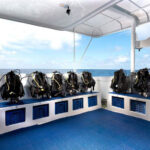We recently had the opportunity to spend some time talking to Simon Pridmore, author of Scuba Fundamental. Simon is a Course Director Trainer, Former Dive Centre Owner, Diver Training Agency Licensee and contributor to The Scuba News. He currently resides in Bali, Indonesia.
- What inspired your latest book, Scuba Fundamental?
Too many people start learning to scuba dive before they are ready for it. Others are ready but have a poor learning experience when they take their first course. In both cases, what usually happens next is that they give up the sport, having wasted both time and money, and end up missing out on what could have been a lifetime of incredible experiences. It’s not their fault. They just don’t know any better.
Before people actually start diving they have no means of judging whether they are really ready, physically and psychologically, to dive. Neither do they have any way of distinguishing a good instructor from a bad instructor or a professional dive operator from a cowboy. Anyone can produce a slick website, decorate an attractive looking shop or deliver a persuasive pitch.
The fact is that scuba diving is the same as every other walk of life. There are many wonderful instructors and super-professional dive centres out there. There are also some terrible, lazy and negligent instructors around and operators that care only about taking the money and deliver poor-quality service in return.
So I decided to write Scuba Fundamental to arm people with the knowledge to enable them to make the right decisions and choices about learning to scuba dive, right from the beginning.
You would think that there are other books out there that do this but that is not the case. Before Scuba Fundamental, every book for beginners assumed the reader was already sitting in the dive centre, waiting to begin their course. There was nothing available that told people, in clear, simple terms, what a good scuba diving course should involve and how they could make sure they made the best of it.
- What do you think readers will like about this book?
I hope they will particularly like the fact that it is straightforward and impartial.
- Do you have any advice for other writers, particularly new ones?
If you have an idea for a book, write it down and keep writing. Don’t worry about anything else at that point, such as who will publish it, who will read it or what others will think of it. Just write it. Work out everything else once you have the first draft written.
- Do you have a favourite book you have written? Why?
I should say my first book “Scuba Confidential,” because it has sold so well but actually I think “Scuba Fundamental” is my favourite. It was the hardest to write and represents something of a Holy Grail. I am quite proud of it.
- Is there any other type of book you would like to write in the future?
Yes, I am writing my first novel now. It is a scuba diving murder mystery set in Guam and Hong Kong. Completely different from everything I have written before.
- What books have influenced your life the most?
Flyaway by Desmond Bagley, which inspired me to become a nomad.
Noble House by James Clavell, which took me to Hong Kong.
The Last Dive by Bernie Chowdhury, which proved that divers do read.
- What started you on your writing journey?
Although I was not aware of it at the time, I trained to be a professional writer while I was working as a civil servant in Hong Kong, writing reports for an audience of busy people. That taught me to write clearly, succinctly and to the point. Then, about fifteen years ago, Asian Diver Magazine editor David Espinosa asked a mutual friend, Gary Bevan, to write a piece on rebreathers. Garry said he didn’t know anything about rebreathers but knew someone who did and pointed David at me. That was the beginning of my career as a scuba diving author.
- Do you have any odd writing habits?
I come up with my best ideas in the shower. This often makes us late for appointments.
Learn more about Simon Pridmore at: http://www.simonpridmore.com












